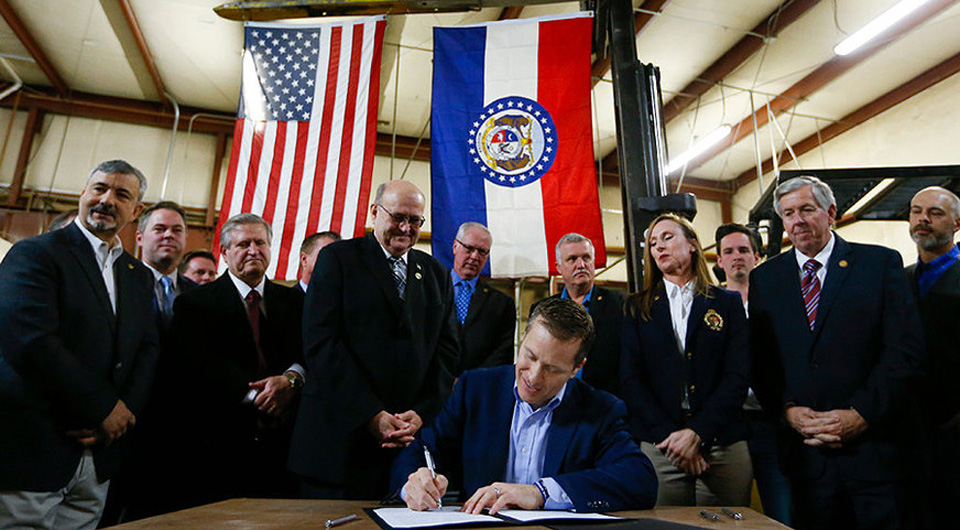
If Missouri’s workers and unions have their way, the state’s majority Republican legislature and its new GOP governor won’t have the last word on the fate of “right to work” in the Show Me State. The voters will.
Even before new Gov. Eric Greitens (R) signed the RTW law, which the heavily GOP legislature pushed through early in 2017 over labor and Democratic opposition, unions and their allies were laying the groundwork to take the issue to the voters next year.
And assuming their ballot drive succeeds, that referendum will be a key index of whether the anti-worker ideology that RTW embodies has staying power among the general populace, not just in Missouri, a classic swing state, but nationwide.
The Missouri RTW law made the state the 28th to name itself right to work, which unions, workers and their allies call “right to work for less.” That’s because RTW states generally have lower wages for workers, fewer worker protections, lower benefits and less political clout for workers and their allies.
And in Congress, right wing congressional Republicans, led by Joe Wilson of rabidly anti-worker anti-union South Carolina, have renewed their push for a national RTW law.
The reasons for these drives? In a word: Money, specifically making sure unions lack it.
RTW isn’t about a worker’s right to join the union or not, or pay dues, or not. It’s about a concerted right wing-GOP-business campaign to defund unions, thus destroying resistance to the corporate-radical right agenda.
How? RTW says any worker – union member or not — whom unions represent on the job can take advantage of union services without paying one red cent for them. Such freeloading weakens unions’ ability to defend anyone at all, the real aim of RTW backers.
The Missouri campaign to put RTW on the state ballot has taken a number of forms. They include:
- A petition drive to get the required number of signatures for a formal vote.
- An informative Facebook page started by the wife of a member of Laborers Local 110.
- Exposure of the special interests pushing RTW, notably a multimillionaire builder from the highly right-wing Joplin area whose campaign contributions and ad spending helped produce the lopsided GOP majorities in the legislature, and Greitens’ win.
- Publication of analyses and studies showing how RTW not only hurts workers but — contrary to backers’ claims — does not encourage businesses to move to, or grow in, Missouri.
The very day Greitens signed RTW, Feb. 6, the state AFL-CIO and the state NAACP filed their referendum petition with the Secretary of State. The Missouri constitution says that legislation passed by the General Assembly must be referred to voters if 5 percent of voters from two-thirds of Missouri’s eight congressional districts order it, creating a citizens’ veto.
Their ballot language, for a proposed constitutional amendment killing RTW, says “That employees shall have the right to organize and to bargain collectively through representatives of their own choosing. No law or ordinance shall restrict or impair an agreement which requires employees to support their chosen collective bargaining representative.”
The state fed, the NAACP and their allies have until Aug. 27, the day before RTW is scheduled to take effect, to collect the 140,000 signatures they need to put it on the 2018 ballot. If they do, that also delays its imposition until after the referendum result. The last time Missouri voters cast ballots on RTW, in 1978, they bounced it by a large margin.
Fearful of such an outcome, the National Right To Work Committee — the extreme business-backed anti-worker anti-union group that fuels the RTW campaigns — is suing in state circuit court to try to stop the vote before it even gets to the ballot box.
“In its lawsuit, the NRTWC has the gall to say the language is misleading as it allegedly ‘fraudulently presents itself as an ‘employees’ rights proposition’ when it only protects those organized in labor unions, not employees who ‘choose to withhold their support,'” St. Louis Labor Tribune publisher Ed Finkelstein says.
“It impacts ALL employees, those who want to join the union and those who do not,” adds Missouri AFL-CIO President Mike Louis. “At the get-go, their argument is, like RTW itself, deceptive. If there was ever a misleading statement, it’s ‘right-to-work,’ which has absolutely nothing to do with a person’s right to a job or his or her right to work, but is designed to trick people into believing something that it’s not.”
“Gov. Greitens is putting Missouri on the same dangerous path of job loss, lower wages and more dangerous work places as Oklahoma and other states that have adopted these anti-working families laws,” Louis told the Labor Tribune. “This referendum will guarantee that employers in Missouri can decide for themselves how to run their businesses and reach agreements with their employees without government intervention.”
“In today’s economy, employers and their employees need to work together to create and keep good-paying jobs,” Louis added. “This referendum stops corrupt politicians and the corporate special interests from trying to micro-manage the private sector and interfere with contracts negotiated between employees and employers.”
Senate Bill 19, the RTW law, makes it a misdemeanor for employers to negotiate a union shop provision in contracts with their unions. “Missouri voters have no desire for government overreach to take us backward on wages and working conditions to benefit an elite few,” UFCW Local 655 President David Cook said, predicting RTW would lose statewide.
“So-called ‘right-to-work’ makes it more difficult for working people to make themselves heard,” said St. Louis University professor and Service Employees Local 1 member Jameson Ramirez. “It will lower wages, slash benefits, and put a secure retirement out of reach for thousands of hardworking Missouri families.” One exception: A narrow “grandfather clause” that protects current union contracts until they expire or are modified.
“By passing so-called ‘right-to-work,’ Greitens and other politicians in Jefferson City chose millionaire CEOs and out-of-state corporate special interests over Missouri’s working families,” said Al Bond, Executive Secretary-Treasurer of the St. Louis–Kansas City Carpenters Regional Council. Bond called the Missouri RTW law “a vicious assault” on workers and “legally flawed,” too.
Kelsey Hulsey isn’t waiting for the referendum push. She’s already getting the word out on Facebook. Her page is called Missouri Wives And Families Against Right To Work.
She started it after breaking down in tears after last year’s election, worried that everything she and her husband Nicholas had worked for “would literally be taken away from us overnight” as a result of Greitens’ triumph and RTW, she told the Labor Tribune. Greitens had made RTW, which term-limited Gov. Jay Nixon (D) vetoed in 2016, his top priority.
“A lot of people don’t understand what ‘right-to-work’ is and how harmful it can be to working families,” Hulsey, a legal secretary, said. “I just felt like I had to be the voice for union wives because I thought, ‘If I don’t do this, who else will?’”
She explained why: When her husband was laid off from an unionized aircraft repair plant a week before their wedding four years ago, the couple had to move, to a RTW state, Indiana, for a year.
“We experienced firsthand what ‘right-to-work’ is, and it was sickening,” Hulsey said. “The hours he had to work were outrageous and he worked for less than half of what he makes now. We were constantly stressing out and wondering if we would ever be able to start a family because after all, we were newlyweds.”
Nicholas was finally able to find a job in Missouri working for the railroads as a member of Smart (Sheet Metal Workers) Local 1823. The couple moved back to the state for a fresh start. After about a year, he was laid off again. That’s when he decided to join Laborers’ Local 110. “Nicholas has never been so happy,” Hulsey said. “He loves his job, and we have thrived. He has wonderful wages and insurance benefits.”
They decided to have kids, helped by insurance, thanks to the unionization of her husband’s job, which paid for fertility treatments. Then RTW came along. Having kids is now on hold, as the Hulseys’ income could drop. “I’m a white-collar daughter who’s become a blue-collar wife,” she said. “I’m just hoping that by sharing my story, I’ll be able to educate others on what ‘right-to-work’ really means.”
The Labor Tribune, other publications and non-partisan institutes are also highlighting studies showing the negative difference that RTW makes in a state.
Federal jobs data show that Missouri added more jobs than any of its “right-to-work” neighbor states over the 12-month span of November 2015–2016. And The Kansas City Business Journal noted that while Missouri added nearly 51,000 jobs in those 12 months, neighboring “right-to-work” state Kansas lost 5,300 jobs, putting it close to the bottom in the nation in job creation, at #47.
Bureau of Labor Statistics data show that seven of the 10 states with the highest jobless rates are RTW states. And BLS adds an average worker in a RTW state makes $6,109 less yearly than a worker in a non-RTW state. In addition, data shows some 13 percent fewer workers in RTW states have health benefits than in non-RTW states. And workers in RTW states have a 49 percent higher chance of getting killed on the job.
“It’s appalling the GOP is so eager to snatch the security and opportunities of so many families away,” said House Minority Floor Leader Gail McCann Beatty, D-Kansas City. “That’s not the type of message we should be sending to our constituents.”












Comments